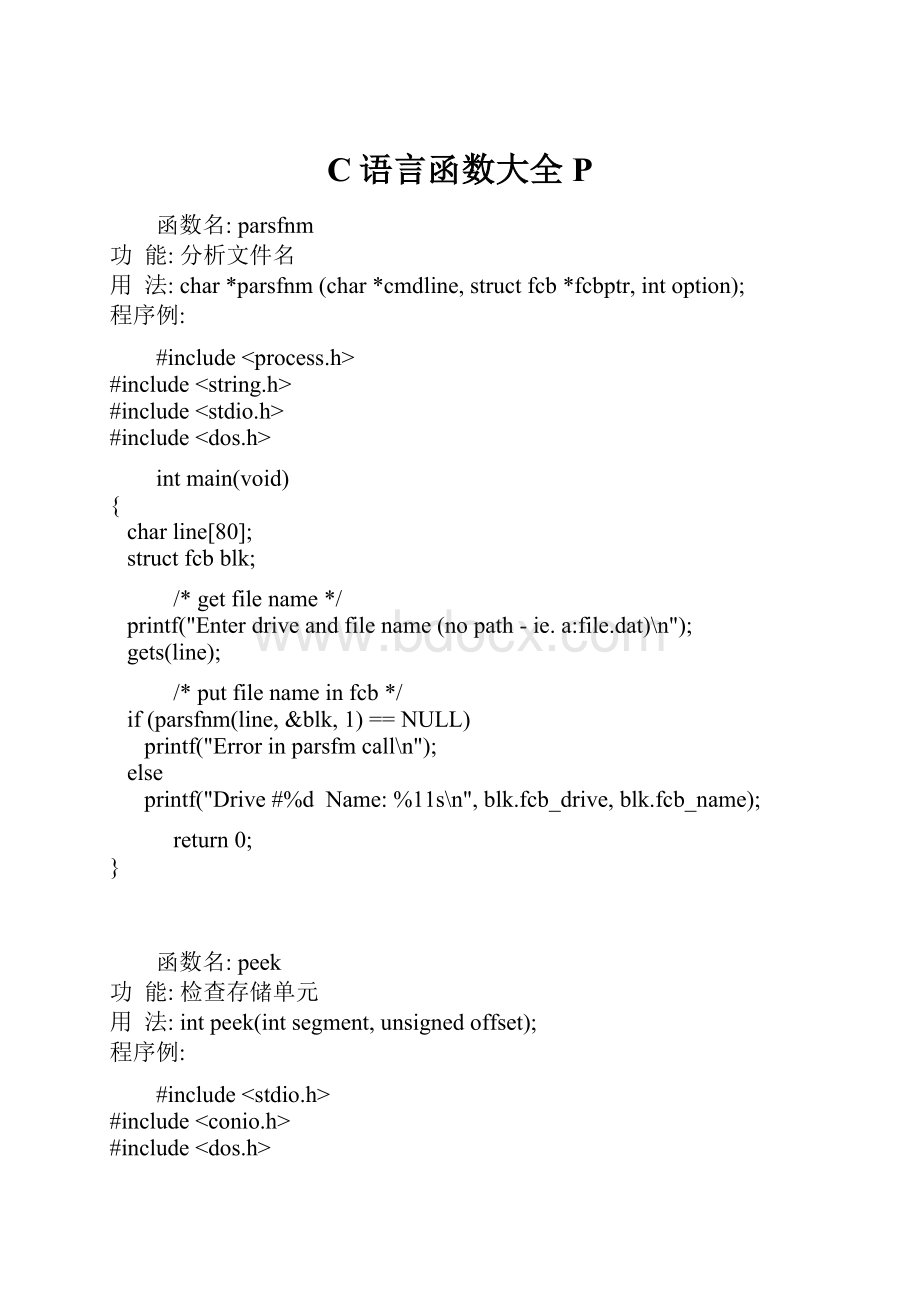C语言函数大全P.docx
《C语言函数大全P.docx》由会员分享,可在线阅读,更多相关《C语言函数大全P.docx(18页珍藏版)》请在冰豆网上搜索。

C语言函数大全P
函数名:
parsfnm
功 能:
分析文件名
用 法:
char*parsfnm(char*cmdline,structfcb*fcbptr,intoption);
程序例:
#include
#include
#include
#include
intmain(void)
{
charline[80];
structfcbblk;
/*getfilename*/
printf("Enterdriveandfilename(nopath-ie.a:
file.dat)\n");
gets(line);
/*putfilenameinfcb*/
if(parsfnm(line,&blk,1)==NULL)
printf("Errorinparsfmcall\n");
else
printf("Drive#%d Name:
%11s\n",blk.fcb_drive,blk.fcb_name);
return0;
}
函数名:
peek
功 能:
检查存储单元
用 法:
intpeek(intsegment,unsignedoffset);
程序例:
#include
#include
#include
intmain(void)
{
intvalue=0;
printf("Thecurrentstatusofyourkeyboardis:
\n");
value=peek(0x0040,0x0017);
if(value&1)
printf("Rightshifton\n");
else
printf("Rightshiftoff\n");
if(value&2)
printf("Leftshifton\n");
else
printf("Leftshiftoff\n");
if(value&4)
printf("Controlkeyon\n");
else
printf("Controlkeyoff\n");
if(value&8)
printf("Altkeyon\n");
else
printf("Altkeyoff\n");
if(value&16)
printf("Scrolllockon\n");
else
printf("Scrolllockoff\n");
if(value&32)
printf("Numlockon\n");
else
printf("Numlockoff\n");
if(value&64)
printf("Capslockon\n");
else
printf("Capslockoff\n");
return0;
}
函数名:
peekb
功 能:
检查存储单元
用 法:
charpeekb(intsegment,unsignedoffset);
程序例:
#include
#include
#include
intmain(void)
{
intvalue=0;
printf("Thecurrentstatusofyourkeyboardis:
\n");
value=peekb(0x0040,0x0017);
if(value&1)
printf("Rightshifton\n");
else
printf("Rightshiftoff\n");
if(value&2)
printf("Leftshifton\n");
else
printf("Leftshiftoff\n");
if(value&4)
printf("Controlkeyon\n");
else
printf("Controlkeyoff\n");
if(value&8)
printf("Altkeyon\n");
else
printf("Altkeyoff\n");
if(value&16)
printf("Scrolllockon\n");
else
printf("Scrolllockoff\n");
if(value&32)
printf("Numlockon\n");
else
printf("Numlockoff\n");
if(value&64)
printf("Capslockon\n");
else
printf("Capslockoff\n");
return0;
}
函数名:
perror
功 能:
系统错误信息
用 法:
voidperror(char*string);
程序例:
#include
intmain(void)
{
FILE*fp;
fp=fopen("perror.dat","r");
if(!
fp)
perror("Unabletoopenfileforreading");
return0;
}
函数名:
pieslice
功 能:
绘制并填充一个扇形
用 法:
voidfarpieslice(intx,intstanle,intendangle,intradius);
程序例:
#include
#include
#include
#include
intmain(void)
{
/*requestautodetection*/
intgdriver=DETECT,gmode,errorcode;
intmidx,midy;
intstangle=45,endangle=135,radius=100;
/*initializegraphicsandlocalvariables*/
initgraph(&gdriver,&gmode,"");
/*readresultofinitialization*/
errorcode=graphresult();
if(errorcode!
=grOk) /*anerroroccurred*/
{
printf("Graphicserror:
%s\n",grapherrormsg(errorcode));
printf("Pressanykeytohalt:
");
getch();
exit
(1);/*terminatewithanerrorcode*/
}
midx=getmaxx()/2;
midy=getmaxy()/2;
/*setfillstyleanddrawapieslice*/
setfillstyle(EMPTY_FILL,getmaxcolor());
pieslice(midx,midy,stangle,endangle,radius);
/*cleanup*/
getch();
closegraph();
return0;
}
函数名:
poke
功 能:
存值到一个给定存储单元
用 法:
voidpoke(intsegment,intoffset,intvalue);
程序例:
#include
#include
intmain(void)
{
clrscr();
cprintf("Makesurethescrolllockkeyisoffandpressanykey\r\n");
getch();
poke(0x0000,0x0417,16);
cprintf("Thescrolllockisnowon\r\n");
return0;
}
函数名:
pokeb
功 能:
存值到一个给定存储单元
用 法:
voidpokeb(intsegment,intoffset,charvalue);
程序例:
#include
#include
intmain(void)
{
clrscr();
cprintf("Makesurethescrolllockkeyisoffandpressanykey\r\n");
getch();
pokeb(0x0000,0x0417,16);
cprintf("Thescrolllockisnowon\r\n");
return0;
}
函数名:
poly
功 能:
根据参数产生一个多项式
用 法:
doublepoly(doublex,intn,doublec[]);
程序例:
#include
#include
/*polynomial:
x**3-2x**2+5x-1*/
intmain(void)
{
doublearray[]={-1.0,5.0,-2.0,1.0};
doubleresult;
result=poly(2.0,3,array);
printf("Thepolynomial:
x**3-2.0x**2+5x-1at2.0is%lf\n",
result);
return0;
}
函数名:
pow
功 能:
指数函数(x的y次方)
用 法:
doublepow(doublex,doubley);
程序例:
#include
#include
intmain(void)
{
doublex=2.0,y=3.0;
printf("%lfraisedto%lfis%lf\n",x,y,pow(x,y));
return0;
}
函数名:
pow10
功 能:
指数函数(10的p次方)
用 法:
doublepow10(intp);
程序例:
#include
#include
intmain(void)
{
doublep=3.0;
printf("Tenraisedto%lfis%lf\n",p,pow10(p));
return0;
}
函数名:
printf
功 能:
产生格式化输出的函数
用 法:
intprintf(char*format...);
程序例:
#include
#include
#defineI555
#defineR5.5
intmain(void)
{
inti,j,k,l;
charbuf[7];
char*prefix=buf;
chartp[20];
printf("prefix 6d 6o 8x 10.2e "
"10.2f\n");
strcpy(prefix,"%");
for(i=0;i<2;i++)
{
for(j=0;j<2;j++)
for(k=0;k<2;k++)
for(l=0;l<2;l++)
{
if(i==0) strcat(prefix,"-");
if(j==0) strcat(prefix,"+");
if(k==0) strcat(prefix,"#");
if(l==0) strcat(prefix,"0");
printf("%5s|",prefix);
strcpy(tp,prefix);
strcat(tp,"6d|");
printf(tp,I);
strcpy(tp,"");
strcpy(tp,prefix);
strcat(tp,"6o|");
printf(tp,I);
strcpy(tp,"");
strcpy(tp,prefix);
strcat(tp,"8x|");
printf(tp,I);
strcpy(tp,"");
strcpy(tp,prefix);
strcat(tp,"10.2e|");
printf(tp,R);
strcpy(tp,prefix);
strcat(tp,"10.2f|");
printf(tp,R);
printf(" \n");
strcpy(prefix,"%");
}
}
return0;
}
函数名:
putc
功 能:
输出一字符到指定流中
用 法:
intputc(intch,FILE*stream);
程序例:
#include
intmain(void)
{
charmsg[]="Helloworld\n";
inti=0;
while(msg[i])
putc(msg[i++],stdout);
return0;
}
函数名:
putch
功 能:
输出字符到控制台
用 法:
intputch(intch);
程序例:
#include
#include
intmain(void)
{
charch=0;
printf("Inputastring:
");
while((ch!
='\r'))
{
ch=getch();
putch(ch);
}
return0;
}
函数名:
putchar
功 能:
在stdout上输出字符
用 法:
intputchar(intch);
程序例:
#include
/*definesomebox-drawingcharacters*/
#defineLEFT_TOP 0xDA
#defineRIGHT_TOP0xBF
#defineHORIZ 0xC4
#defineVERT 0xB3
#defineLEFT_BOT 0xC0
#defineRIGHT_BOT0xD9
intmain(void)
{
chari,j;
/*drawthetopofthebox*/
putchar(LEFT_TOP);
for(i=0;i<10;i++)
putchar(HORIZ);
putchar(RIGHT_TOP);
putchar('\n');
/*drawthemiddle*/
for(i=0;i<4;i++)
{
putchar(VERT);
for(j=0;j<10;j++)
putchar('');
putchar(VERT);
putchar('\n');
}
/*drawthebottom*/
putchar(LEFT_BOT);
for(i=0;i<10;i++)
putchar(HORIZ);
putchar(RIGHT_BOT);
putchar('\n');
return0;
}
函数名:
putenv
功 能:
把字符串加到当前环境中
用 法:
intputenv(char*envvar);
程序例:
#include
#include
#include
#include
#include
intmain(void)
{
char*path,*ptr;
inti=0;
/*getthecurrentpathenvironment*/
ptr=getenv("PATH");
/*setupnewpath*/
path=malloc(strlen(ptr)+15);
strcpy(path,"PATH=");
strcat(path,ptr);
strcat(path,";c:
\\temp");
/*replacethecurrentpathanddisplaycurrentenvironment*/
putenv(path);
while(environ[i])
printf("%s\n",environ[i++]);
return0;
}
函数名:
putimage
功 能:
在屏幕上输出一个位图
用 法:
voidfarputimage(intx,inty,voidfar*bitmap,intop);
程序例:
#include
#include
#include
#include
#defineARROW_SIZE10
voiddraw_arrow(intx,inty);
intmain(void)
{
/*requestautodetection*/
intgdriver=DETECT,gmode,errorcode;
void*arrow;
intx,y,maxx;
unsignedintsize;
/*initializegraphicsandlocalvariables*/
initgraph(&gdriver,&gmode,"");
/*readresultofinitialization*/
errorcode=graphresult();
if(errorcode!
=grOk) /*anerroroccurred*/
{
printf("Graphicserror:
%s\n",grapherrormsg(errorcode));
printf("Pressanykeytohalt:
");
getch();
exit
(1);/*terminatewithanerrorcode*/
}
maxx=getmaxx();
x=0;
y=getmaxy()/2;
/*drawtheimagetobegrabbed*/
draw_arrow(x,y);
/*calculatethesizeoftheimage*/
size=imagesize(x,y-ARROW_SIZE,x+(4*ARROW_SIZE),y+ARROW_SIZE);
/*allocatememorytoholdtheimage*/
arrow=malloc(size);
/*grabtheimage*/
getimage(x,y-ARROW_SIZE,x+(4*ARROW_SIZE),y+ARROW_SIZE,arrow);
/*repeatuntilakeyispressed*/
while(!
kbhit())
{
/*eraseoldimage*/
putimage(x,y-ARROW_SIZE,arrow,XOR_PUT);
x+=ARROW_SIZE;
if(x>=maxx)